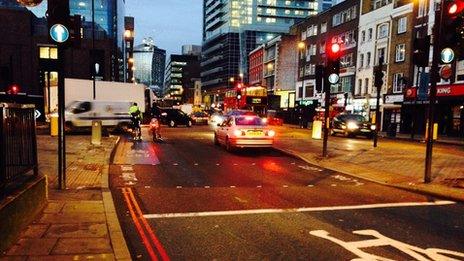Whitechapel bus collision leaves cyclist dead
- Published

The crash happened at the junction of Whitechapel High Street and Commercial Road
A fifth person in nine days has been killed cycling on London's roads.
The man died in hospital in the early hours following a collision with a double-decker bus in Whitechapel High Street near Aldgate East station in east London, late on Wednesday.
Deputy Prime Minister Nick Clegg called for cycle superhighways to "physically separate cyclists from roads".
On Wednesday, a vigil was held after Venera Minakhmetova, 24, was killed in a crash with a lorry at Bow Roundabout.
It is thought the Russian national, who was living in the Bethnal Green area, had been cycling on Cycle Superhighway 2 (CS2) just before the collision.
Following the latest death chief executive of London Cycling Campaign, Ashok Sinha, said the "death toll is utterly intolerable".
The group has urged cyclists to write to London Mayor Boris Johnson take immediate action, including upgrading CS2 to "continental standards", external.
The man, believed to be aged in his 30s, who died after the crash on Whitechapel High Street on Wednesday night at 23:30 GMT, was on CS2 when he was fatally injured.
Transport for London said preliminary investigations suggested the cyclist was "travelling across Whitechapel High Street from Leman Road" when the collision happened - approaching the junction from south to north.
Leman Street, which is not on CS2, is a one-way street going north to south, TfL said.
The as yet unnamed cyclist was not wearing a helmet at the time of collision with the route 205 bus, Metropolitan Police said.
The superhighways - cycle routes running from outer London into and across central London - were designed to provide safe, fast and direct journeys for cyclists.
They usually comprise blue painted stretches of road earmarked for cyclists, but some lanes that are segregated from traffic have been introduced, with more planned.
Another cyclist who was killed outside East Croydon train station on Tuesday has been named as Roger William De Klerk, an IT consultant and courier, of Forest Hill, south-east London.

The map shows when and where the fatal crashes took place
A post-mortem examination revealed his death was caused by compression of the head, neck and chest.
Mr Clegg told LBC: "Distressing as all this is, I really hope it doesn't discourage people from bicycling - it's got to be made safer and we have got to have more of these bicycling superhighways which physically separate cyclists from roads.
"We as a government have said we want to make new road schemes fit for cyclists and at the same time we'll look at every other suggestion to make this a safe thing to do."
Mayor Johnson's Vision for Cycling document, external also proposes the introduction of so-called Quietways on "low-traffic back streets" for cyclists to use.
Cycling Commissioner Andrew Gilligan : "We recognise that the superhighways need upgrading and we're doing that"
Shadow infrastructure minister Lord Adonis said on Twitter that Mr Johnson must review the situation.
He said: "The mayor should appoint a rapid independent review of superhighways after the horror of all these cyclists' deaths in London."
Thirteen cyclists have died on London's roads so far this year. Fourteen died in 2012, according to Transport for London (TfL).
Route upgrades
London Mayor Boris Johnson told LBC: "There's no question of blame or finger-pointing.
"That doesn't work in these circumstances," he added.
"But unless people obey the laws of the road and people actively take account of the signals that we put in, there's no amount of traffic engineering that we invest in that is going to save people's lives."
Earlier, the mayor's cycling commissioner, Andrew Gilligan, told BBC London plans to upgrade all the superhighway routes would go out to consultation in four months and that it would take 11 months for any changes to happen.
He pointed out that there were 69 pedestrian deaths last year but that pedestrians did not have as strong a voice in the media.
Cycle superhighways will remain
But leader of Southwark Council Peter John, asked the mayor to consider banning HGVs during peak hours.
"We need new ideas and so I propose banning HGVs London-wide during rush hour as a major step in the right direction," he said.
"Cyclists having an hour in the morning and in the evening where they don't have to share the road with large lorries could very well help keep them safer."
On Tuesday of last week a cyclist died after a collision with a tipper lorry on Mile End Road in east London on CS2.
On Friday, architectural expert Francis Golding died after a crash involving a coach on Tuesday last week in Holborn, central London.
On Tuesday, IT consultant and courier Roger William De Klerk, 43, died after a crash with a bus in Croydon, south London.
On Wednesday, Venera Minakhmetova, 24, was killed in a lorry crash at Bow Roundabout in east London.
The Met said three of those killed had family abroad. This had slowed up the formal identification process.
- Published14 November 2013
- Published13 November 2013
- Published13 November 2013
- Published13 November 2013
- Published12 November 2013
- Published11 November 2013
- Published7 November 2013